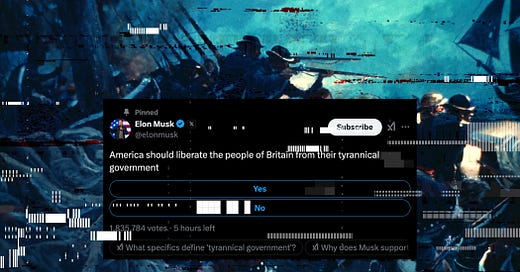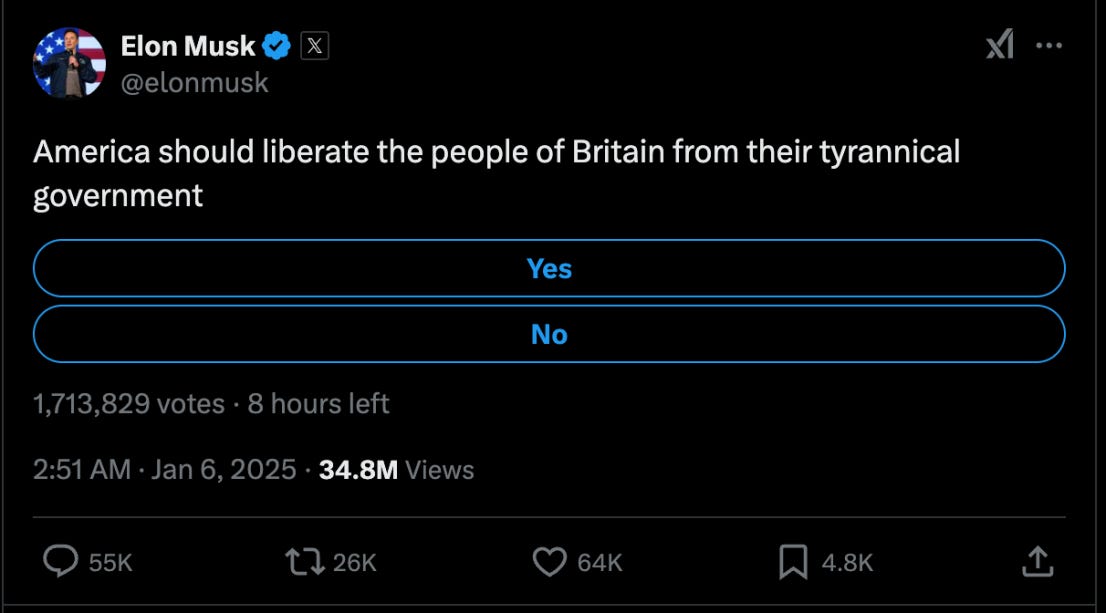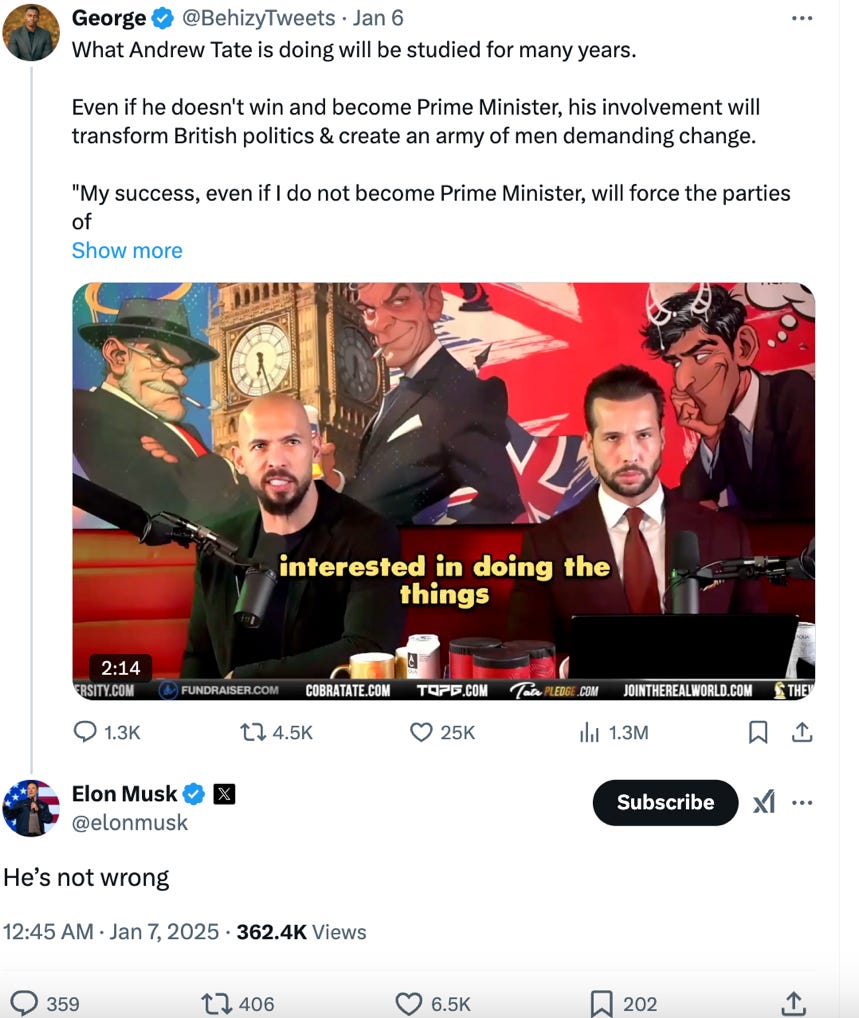Musk’s Phony War on Grooming Gangs
The scandal is real. But Elon Musk’s incendiary rhetoric about British politics are doing more harm than good.
OVER THE PAST FEW DAYS, Elon Musk has been helping fuel a ragestorm on X about “grooming gangs” in the United Kingdom, a story that first made news in the small town of Rotherham in the early 2010s and recently resurfaced with the publication of shocking excerpts from some of the cases. Among other things, Musk has accused a junior Labour minister, Jess Phillips, of being a “genocidal rape apologist” for rejecting a request for a national inquiry into grooming gangs; urged that nativist flamethrower Tommy Robinson, serving a sentence for contempt of court for repeatedly and knowingly circulating slanders against a Syrian refugee, be freed immediately; proposed prison for Prime Minister Keir Starmer; and polled his followers about an American invasion of the U.K.:
Political histrionics aside, the gang sexual abuse scandal is real, tragic, and outrageous. From the late 1990s to the early 2010s, thousands of girls as young as 11 were abused and sometimes trafficked in dozens of towns across England (an estimated 1,400 just in Rotherham). Several girls were murdered; others were terrorized with violence or threats, or tortured in ways that are horrifying to read. It’s also true that for years, attempts to bring these horrors to the attention of the authorities were ignored or even swept under the rug by police, social workers, and local government officials. In some areas, including Rotherham, the authorities’ reluctance to investigate was at least partially motivated by skittishness about racial and religious sensitivities, since most local offenders were of South Asian (usually Pakistani) background and Muslim.
But the narrative pushed by Musk and his amen chorus of pundits and “influencers”—such as tech tycoon Bill Ackman, who has made the dramatic but unsupported assertion that “hundreds of thousands of young British girls have been gang raped by members of principally one ethnic group”—has little to do with fact. It’s simply not true, for instance, that the British political establishment “had hoped they had buried the story after a few symbolic prosecutions” and that “the media showed little interest” until “Elon Musk started tweeting.” In reality, a bombshell report on the gang sexual abuse in Rotherham prepared by retired social work inspector Alexis Jay, commissioned by the local government and released in 2014, received massive national exposure—not only in the right-of-center Times, which had extensively covered the story since 2011, but by left-wing outlets like the Guardian, which did not shy away from the ethnic and cultural aspects of the problem. This was followed by other local and national investigations, including a 2020 Home Office report on “Group-based child sexual exploitation.” Phillips’s supposedly nefarious rejection of a national inquiry, in response to a request from the town of Oldham, was accompanied by a recommendation for an inquiry by local authorities, an approach that had proved effective in other municipalities.
A similar request had been rejected in 2022 on similar grounds by the Conservative government led by Prime Minister Liz Truss. But under her Conservative successor, Prime Minister Rishi Sunak, a national Grooming Gangs Taskforce was established; according to a Home Office report from May—long before Brave Sir Elon rode to the rescue—its work has led to the arrests of “over 550 suspects.” (As for the prosecutions being “symbolic” and “few,” at least sixty perpetrators have been convicted in Rotherham alone, with the ringleader sentenced to thirty-five years in prison and several other men receiving sentences upward of twenty years.)
HERE’S ANOTHER SALIENT FACT: The entire municipal borough council of Rotherham resigned in February 2015 after a parliamentary inquiry found damning evidence of coverup and failure, and town management was placed under the central government’s control until the next election. Is this enough accountability? No—but it puts the lie to allegations that the British government has ignored or covered up the issue.
As for Musk’s imprecations against Starmer: Dan Hodges, a columnist for the conservative Daily Mail who is harshly critical of Labour’s recent response to the grooming gangs scandal, nonetheless notes that as director of public prosecutions from 2008 to 2013, Starmer introduced meaningful reforms that made it easier to bring child rapists to justice, including “a new national network of over 80 specialist prosecutors, a Child Sexual Abuse Review Panel and a ‘victim’s right to review,’ which finally gave the abused the right to challenge any decision not to prosecute.”
Musk’s lionization of Tommy Robinson is equally misguided: Julie Bindel, who has reported on the grooming gangs for years, notes that Robinson did nothing to uncover the story but did jeopardize prosecutions with his publicity-hounding.
Meanwhile, Musk’s online troops, including MAGA stalwarts such as Turning Point USA’s Charlie Kirk, are using the grooming gangs scandal to promote the idea that white people in multicultural England are grievously oppressed. Not surprisingly, the inflammatory details of this oppression often turn out to be substantially misrepresented. Kirk and others have pointed to a supposed judicial ruling that child sex abusers should be punished more harshly if their victims are Asian rather than white. In reality, the 2015 judgment explicitly rejected the defense claim that the enhanced sentence for the offender was ethnically or racially motivated. Rather, the judge said, it was based on the family’s victim impact statement, which described the distress suffered by the two abused girls, magnified by the “shame” attached to sexual abuse in their community.
One could criticize the decision as misguided and as discriminatory in effect. But there is no evidence that such reasoning would apply to nonwhite victims from a more culturally liberal background, or that it would not apply to white victims from communities where stigma against sexual abuse survivors still persists.
YEARS BEFORE MUSK “started tweeting” about this, there was already widespread agreement that political correctness about race played a role in the initial grooming gang coverup, probably less because of “woke” ideology than because of desire to avoid controversy and out of fear of alienating Muslim voters. But political correctness certainly wasn’t the only factor: As Jay notes in her 2014 Rotherham report, the shockingly dismissive attitudes shown in the early 2000s toward reports of young girls being sexually trafficked reflected a tendency to view underage prostitutes as juvenile delinquents rather than victims and a callousness toward girls from lower-class, dysfunctional backgrounds.
There is also troubling evidence (again, published in mainstream British media years ago) that some of the predators were motivated by racial and religious animus—or at least that they regarded non-Muslim girls as promiscuous, immodest, and fair game for sexual abuse. Yet many right-wing activists and pundits have seized on these facts to make sweeping and incendiary claims about a wave of anti-white hate crime by nonwhite foreigners. When the Home Office noted in its 2020 report that the majority of those who commit gang child sexual abuse are not South Asian Muslims and urged caution about extrapolating from limited and inconclusive data, Telegraph columnist Sam Ashworth-Hayes and GB News reporter Charlie Peters accused the authors of a “whitewash.”
But in fact, the data are limited and often difficult to obtain. For instance, while there are claims that South Asian perpetrators deliberately targeted white girls, the 2014 Jay report suggests that South Asian abuse victims were less likely to be identified for a variety of reasons—a sort of survivorship bias in the data on survivors. (It should be noted that the local population was overwhelmingly white.) Nor do we know if the predators, many of whom were taxi drivers or takeout delivery men working late at night, chose their victims on the basis of ethnicity or vulnerability.
Would a full national inquiry help untangle some of these issues? Maybe. (Unfortunately, the independent national inquiry that was commissioned in 2015 after Jay’s Rotherham report, and which released its own report in October 2022, had an overbroad focus on child sexual abuse in general and ended up barely mentioning gang sexual abuse.) But a highly politicized anti-immigrant and anti-Muslim frenzy is hardly a climate in which a useful investigation can happen, especially when many of those calling for an inquiry already know what they want to find: a Muslim rape jihad against white England and a damning indictment of immigration and racial diversity. Bindel, whom no one would accuse of being politically correct, strongly condemns “cultural relativism that leads to certain groups of men getting away with child rape”—but is equally scathing about far-right exploitation and distortion of the issue, including lack of interest in child sex abuse by white British men.
Conservatives have been highly, and rightly, cognizant of the ways in which well-meaning progressive campaigns against sexual violence have led to inflated or fact-free claims about “rape culture” on college campuses and to injustices toward the accused. The response to “grooming gangs” surely requires similar caution—all the more so when it encourages racial and religious demonization.
As for the sincerity of Musk’s crusade against sexual violence, it can be gauged by the fact that, right on the heels of his tweets castigating British pols for supposedly being soft on child rape, he seemed to endorse the entry into British politics of Andrew Tate, the self-styled misogynist influencer whose advice to men includes “slap, slap, grab, choke, shut up, sex” as a response to a woman’s accusation of cheating.
Aside from his repugnant views, Tate is currently facing charges in Romania and in the U.K. that include not only sexual aggression but sexual trafficking of women—and underage girls. Where’s Musk’s concern about that?







